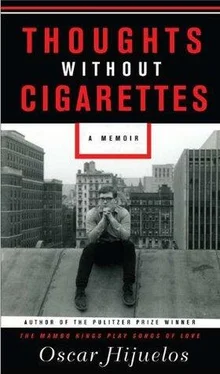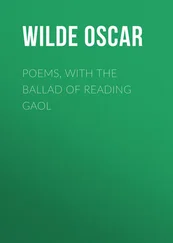On the weekends, before my life had changed, whenever our apartment filled with visitors, and my father’s friends from all over the city came by to visit, it was Spanish they spoke. Oh, some like my sharp cousin Jimmy Halley, formerly of Holguín, Cuba, and a building manager in Queens, and mi padrino , Horacio, who worked for a Chase branch in Chinatown, knew English, as did my father from his job as a cook in the Men’s Bar of the Biltmore Hotel. But I have no memories of hearing them speak it. I must have exchanged some words with our elderly, genteel across-the-hall neighbor, Mrs. Blair, or with our German superintendent, the jolly Mr. Hess, rotund and red cheeked, always sweeping with a broom in the halls. But since I spent most of my days as an infant with my mother, going just about everywhere with her — to the nearby Columbia University campus, by whose fountains we would sit, or down the hill to Morningside Drive and the circle that looked eastward over Harlem, where the other young mothers from that block sometimes gathered with their strollers and baby carriages — that language, Spanish, must have permeated me like honey, or wrapped around my soul like a blanket or, if you like, a mantilla, or, as my mother, of a poetic bent, might say, like the sunlight of a Cuban spring.
It was on Morningside Drive, incidentally, where the first pictures of me as an infant were taken: They show this thin and rather delicately featured child, with curling blond hair, in white booties and a dainty outfit, standing by a bench, a passably cute toddler, but not the sort one would have associated, at first glance, with the usual expectations of what the offspring of a Cuban couple should look like, which is to say, anything but a little towhead americano .
Now, if I turned out that way, it’s because I owed my looks to a great-great-grandfather on my father’s side who had been Irish; white as white could be, I had hazel eyes, and altogether an appearance that, given my parents’ more “Spanish” looks, set me apart from them. My mother’s antecedents, the Torrens y Barrancas and Olivers y Guap families, were light-skinned Catalans, and my papi , Pascual Hijuelos, a Gallego by ancestry, and blond as a child himself, tended toward a Spaniard’s ruddiness that, in fact, was probably Celtic as well. But both of my parents had dark hair and dark eyes and were unmistakably Cuban in their manner, their speech, and, yes, in that great definer of identity, their body language and souls. My brother, José, fell somewhere in between: He was also fair skinned, his eyes were dark and intense, and his hair, of a brownish-red coloration, bespoke somewhat more Latino origins, though, while growing up and as a ringer in his late teens for that old-time actor John Garfield, he too would hear that he didn’t particularly look or seem Cuban, at least not until he had occasion to speak Spanish. And while I’ve long since discovered that a few of my relatives attracted the same mistaken notion from strangers—“Are ya really Cuban?”—but were hardly bothered by it, for they knew just who they were, I’d find out that vaguely consoling fact years later, after it no longer seemed to matter and the damage to my ego had already been done.
In the hospital, my mother would sit back, across from me, muttering something to herself — no one being around to help her. Maybe in her moments alone, waiting, she prayed — a little black rosary inside her purse — though I bet that just as often as she asked God for guidance or gave thanks, she chastised him for doing such a lousy job. And why wouldn’t she? Somewhere along the line, during this long period of separation from my family, when that partition between my mother and me became the story of our lives, I had absorbed English from the nurses, doctors, and children of my acquaintance with some kind of desperate ease. English in, Spanish out, or at least deeply submerged inside me — from my childhood onward, I have had long complicated dreams in which only Spanish is spoken.

The kicker was that I’d gotten sick in Cuba, on a trip born, in part, of my mother’s homesickness. Since coming to New York in 1943 as my father Pascual’s young bride from Holguín, she’d returned only once, with my brother some six years before, in 1949 or so, and I suppose that, aside from missing her family, she wanted to show me, her second son, off to them. But it’s also possible that by then, my mother and father needed a break from each other, for at that point, their marriage was already going through its share of tensions having to do with some lingering animosities between them that went back to an earlier time. (You must now see my father as he surely had been in the 1940s: a jaunty lady-killer, about six foot one, with a former campesino ’s wide-eyed wonderment over life in the city, a smoothness in his manner, his wavy dark hair brilliant with lotion, and his face redolent of both cologne and cocky self-confidence, all of which amounted to a formula: Pascual + nightlife = my mother’s loneliness and befuddlement.)
My father had originally come up to join two of his sisters who had left Cuba for New York in the early 1940s. My aunt Borja, five years younger than my father and married to a fellow named Eduardo Basulto, worked as a bilingual travel agent for Pan American airlines. She had studied English in either Holguín or Havana and had started with the airline just after they initiated their popular Cuba-bound routes from New York in 1939. I think she’d been transferred to New York as the result of a promotion, and what her husband did, I do not know — I’ve heard that he was a businessman, in what line of negocios I can’t say — but it was his signature and name, Basulto, that adorned the lease to the first-floor apartment in which my brother and I would be raised. Now, how and why Eduardo Basulto ended up settling on a first-floor tenement flat in such a nondescript university neighborhood, way uptown from the bustle, where mostly working-class Irish and college folks lived, I can’t say. Perhaps he’d gotten tipped off by a Cuban who lived around there, or perhaps, while looking through the want ads in a Spanish-language newspaper, like El Diario , had come upon a listing for a cheap apartment in a “quiet enclave” near a park and just a five-minute walk from the subway station on Broadway. Situated at 419 West 118th Street, in a building that had gone up around 1900, that apartment was a far cry from a typical solar in Cuba. Of a “railroad” configuration, it consisted of a living room that faced the street; an adjoining bedroom with French doors, the room’s window opening to a darkish courtyard; a narrow kitchen, which with its leaking pipes had already seen better days; and a long dimly lit hallway that led to a bathroom and two smaller rooms in the back. Neither fancy nor completely crumbling (yet) and situated directly above a basement with rumbling boilers and noisome plumbing, as a more or less temporary place to live, it would do. Slowly my aunt and her husband filled it with furnishings. Some bric-a-brac and photographs from Cuba soon adorned the walls, and blue linoleum had been put in by the management company to cover the floors. Outside in the entryway foyer, the name Basulto in discreet lettering was printed on a slot over the mailbox and bell for apartment number 2, alongside such others as Blair and Walker and Hall.
Once they had settled in, my father’s oldest sister, Maya, and her dapper husband, Pedro Tellería, joined them. It must have seemed a logical and familial thing for them to do; Pedro made his living as a musician, playing the double bass with one of Xavier Cugat’s orchestras, and as it happened, during that early heyday of big-band Cuban music, often performed in some of the more fancy venues in the city. As for Maya, she too went to work, in Macy’s as a salesclerk, and along the way, missing my father, with whom she was close, began to write him regularly, her letters encouraging him to come north for a visit— de visita —a notion that he, under his sister’s sway (my mother would always say that she “dominated” him) took to heart.
Читать дальше













